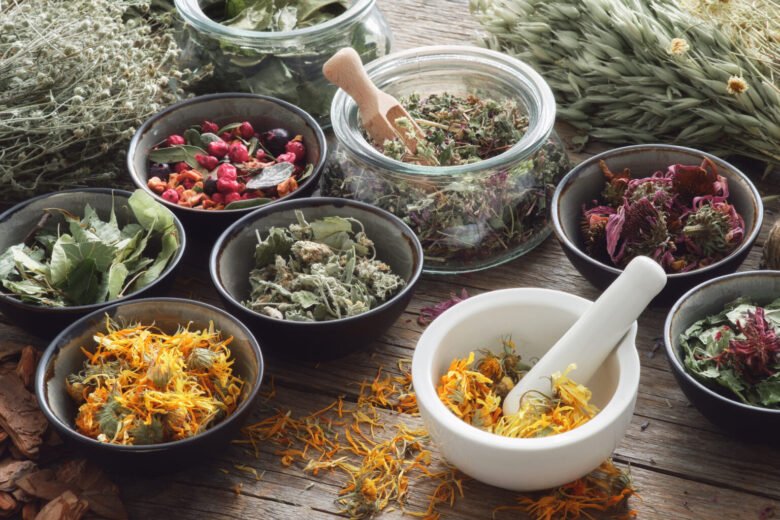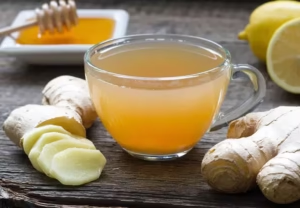Introduction to Herbal Medicine
Herbal medicine, a practice rooted in ancient traditions, encompasses the use of plants and plant extracts for therapeutic purposes. Historical records reveal that civilizations across the globe have relied on herbal remedies to address various ailments. From the ancient Egyptians and their medicinal papyrus scrolls to traditional Chinese medicine, herbs have played a central role in healing practices and cultural rituals. The reverence for these natural remedies underscores their significance in human health and wellness throughout history.
The evolution of herbal medicine continues to capture the interest of health professionals and researchers today. In various cultures, different plants have been identified not only for their flavor in culinary applications but also for their notable health benefits. For instance, Ayurvedic practices in India emphasize the holistic use of herbs, focusing on balancing the body, mind, and spirit. Similarly, Native American traditions employ a diverse range of native plants, such as sage and echinacea, recognized for their healing properties. These practices illustrate how diverse cultural backgrounds have contributed to a rich repository of knowledge regarding herb utilization.
In contemporary times, there has been a resurgence of interest in herbal medicine, as modern society seeks natural solutions for common health issues. This revival is evident in the growing popularity of herbal supplements and remedies, often viewed as alternatives or complements to conventional medical treatments. Clinical research continues to explore the efficacy and safety of various herbs, confirming what traditional healers have practiced for centuries. As we delve deeper into specific health issues in this blog, it is vital to appreciate the foundational role that herbal medicine has played across cultures and its continued relevance in today’s health landscape.
Understanding Common Health Issues
In contemporary society, many individuals grapple with various health issues that impact their everyday lives. Among the most prevalent ailments, headaches, digestive problems, anxiety, and fatigue stand out, often requiring effective management strategies to enhance overall well-being.
Headaches, for instance, are a common occurrence and can be triggered by numerous factors, such as stress, dehydration, or poor posture. They can range from mild discomfort to debilitating pain, significantly affecting one’s ability to function normally. Chronic headaches, including migraines, may require a comprehensive approach that includes lifestyle adjustments and potential intervention strategies. This highlights the need for remedies that are not only effective but also accessible, as many seek alternatives to prescription medications.
Digestive problems also pose significant challenges for many, with issues such as bloating, gas, and irritable bowel syndrome affecting daily routines and quality of life. The gut plays a crucial role in overall health, and when it is compromised, it can lead to a cascade of other health issues. Individuals often seek natural solutions that can promote digestive health, alleviate discomfort, and restore balance.
Anxiety represents another widespread concern, often compounded by the fast-paced nature of modern life. Many individuals experience occasional anxiety, while others may suffer from chronic conditions that hinder their daily activities. The mental toll of anxiety highlights an increasing demand for natural solutions, which can help manage symptoms without the side effects commonly associated with pharmaceutical treatments.
Lastly, fatigue, a feeling of persistent tiredness, is experienced by individuals of all ages. It can result from various underlying factors, including poor sleep quality, stress, or nutritional deficiencies. Understanding these common health issues is paramount, as they provide essential context for the herbal solutions that will be discussed in the subsequent sections. By addressing these ailments holistically, individuals can explore alternative pathways to achieving improved health and vitality.
Healing Herbs for Digestive Health
Maintaining digestive health is essential for overall well-being, and several herbs have been traditionally utilized to promote effective digestion. Among the most notable are ginger, peppermint, and fennel, each offering unique benefits for alleviating symptoms such as bloating, indigestion, and nausea.
Ginger, known for its anti-inflammatory properties, is widely recognized for its effectiveness in managing digestive issues. It contains compounds like gingerol and shogaol, which can help relax the muscles of the gastrointestinal tract. This relaxation promotes more efficient digestion and can alleviate symptoms of nausea and bloating. Ginger can be consumed in various forms, including fresh slices in hot water as tea, powdered form in meals, or as capsules. A typical dosage for digestive aid is about 1 gram of fresh ginger or roughly 1-2 teaspoons of dried ginger per day.
Peppermint is another herb that holds a prominent place in promoting digestive health. It has menthol, which provides a soothing effect on the digestive tract, helping to relieve discomfort associated with flatulence and indigestion. Peppermint can be ingested as tea, capsules, or even in essential oil form when diluted. For optimal digestive benefits, a cup of peppermint tea after meals can be particularly effective. It is advisable to consume around 1-2 teaspoons of dried peppermint leaves steeped in hot water.
Fennel seeds are well-known for their ability to address digestive discomfort effectively. Rich in anethole, a compound responsible for their aroma, fennel can aid in reducing bloating and gas. To prepare, one can chew on a teaspoon of fennel seeds after meals or brew them into a tea by steeping the seeds in boiling water. A typical recommendation is to consume about 1-2 teaspoons of fennel seeds, either whole or as tea, to facilitate optimal digestion.
Incorporating these herbs into your daily routine may help promote better digestive health and alleviate common gastrointestinal issues. Always consult a healthcare provider before starting any new supplement or herbal regimen, particularly if you have underlying health conditions or are pregnant.
Natural Remedies for Stress and Anxiety
In today’s fast-paced world, stress and anxiety have become common challenges that many individuals face. Fortunately, nature offers a myriad of herbs known for their calming properties that can serve as effective natural remedies. Among these, chamomile, valerian root, and ashwagandha stand out as prominent options for alleviating symptoms of stress and anxiety.
Chamomile, long revered for its soothing effects, is often consumed as a tea. It contains apigenin, an antioxidant that binds to specific receptors in the brain, effectively inducing relaxation and reducing anxiety levels. Incorporating chamomile into one’s nightly routine can serve as a gentle cue for the body to unwind, and its pleasant flavor makes it an enjoyable addition to any diet.
Valerian root is another herb commonly recognized for its anxiolytic effects. Traditionally used to improve sleep quality, it is known to promote relaxation without the drowsiness often associated with pharmaceuticals. Valerian can be taken in capsule form or brewed as a tea. Its unique ability to support both relaxation and sleep makes it a dual-purpose herb that can help individuals manage stress and anxiety effectively.
Ashwagandha, an adaptogenic herb that has gained popularity in recent years, works by helping the body cope with stress. It is believed to lower cortisol levels, which are often elevated during periods of stress. Including ashwagandha in one’s daily regimen, whether in powder form added to smoothies or as a supplement, can bolster resilience against stressors over time.
To maximize the benefits of these herbs, consistency is key. Establishing a daily routine that incorporates these natural remedies can lead to a noticeable reduction in stress and anxiety. Embracing these herbal solutions not only fosters mental well-being but also promotes a holistic approach to health that can be beneficial in today’s demanding environment.
Herbs for Energy and Fatigue
In today’s fast-paced world, many individuals experience fatigue and a lack of energy, often seeking natural remedies to combat these challenges. Among the plethora of options, certain herbs stand out for their potential to enhance vitality and alleviate tiredness. This section explores the benefits of three noteworthy herbs: ginseng, rhodiola, and maca root.
Ginseng, particularly Panax ginseng, has been historically utilized in traditional medicine to boost energy levels and improve overall stamina. It is believed that ginseng works by stimulating the central nervous system, thereby enhancing physical endurance and reducing feelings of exhaustion. Research has shown that ginseng may improve cognitive function, thus providing both mental and physical energy boost. For those looking to incorporate this herb, it is advisable to consult with a healthcare provider to determine the appropriate dosage.
Another herb, rhodiola rosea, is frequently used to combat fatigue and enhance mental performance. This adaptogen helps the body adapt to stress, which can play a significant role in feelings of tiredness. By regulating cortisol levels and enhancing the body’s resilience to stressors, rhodiola may increase energy and concentration. Users often report a sense of increased vitality after consistent use, making it a popular choice for those engaged in demanding physical or mental activities. As with ginseng, individuals should consider professional guidance for optimal dosing.
Maca root, a nutrient-rich plant native to the Andes mountains, is noted for its ability to boost energy and improve stamina. Rich in vitamins and minerals, maca is thought to enhance overall well-being while increasing energy levels. It operates by normalizing hormone levels in the body, which can combat fatigue while enhancing physical performance. Maca can be consumed in various forms, including powder or capsules, providing flexibility in how it is integrated into the daily diet.
In conclusion, herbs such as ginseng, rhodiola, and maca root serve as promising natural solutions for boosting energy and managing fatigue. Their unique mechanisms of action not only contribute to increased vitality but also support overall health. Individuals considering these herbs should prioritize safe usage practices and consult with healthcare professionals to ensure efficacy and safety.
Herbal Solutions for Headaches and Migraines
Headaches and migraines affect a significant portion of the population, leading many individuals to seek natural remedies to alleviate their symptoms. Several herbs have shown promise in providing relief from these common health issues, notably feverfew, butterbur, and peppermint oil. Each of these herbs contains unique compounds that can contribute to pain relief and reduction of headache frequency.
Feverfew, a perennial herb native to Europe, has been traditionally used to treat headaches. Studies suggest that feverfew may inhibit the release of certain substances in the brain, such as serotonin and prostaglandins, which are associated with headache onset. According to research published in the Journal of Neurology, individuals who regularly consume feverfew have reported a significant decrease in headache intensity and frequency. The recommended dosage generally involves consuming feverfew in its dried form or as a standardized extract.
Butterbur is another herb worth noting in the context of migraine relief. This plant, which grows in wetland areas, contains petasin and isopetasin, compounds that have anti-inflammatory and muscle-relaxant properties. Research conducted by the American Academy of Neurology found that people who took butterbur were less likely to experience frequent migraines compared to those who did not. However, it is vital to seek products labeled as “PA-free,” as certain preparations can have harmful liver effects.
Peppermint oil, derived from the leaves of the peppermint plant, is well-regarded for its analgesic properties. Applying diluted peppermint oil topically on the forehead and temples has been documented to relieve tension headaches, likely due to its cooling effect and ability to enhance blood circulation. A study highlighted in the International Journal of Clinical Rheumatology emphasized that individuals experienced favorable outcomes when treatment included peppermint oil. Given these findings, utilizing peppermint oil as an adjunctive therapy may offer beneficial effects for headache relief.
Employing these herbal solutions—feverfew, butterbur, and peppermint oil—can be effective means of managing headaches and migraines. Utilizing proper dosages, consulting healthcare professionals, and adhering to best practices can enhance the potential benefits of these natural remedies.
Integrating Herbs into Your Daily Life
Incorporating herbs into your daily routine can significantly enhance your overall health and well-being. With a variety of options available, herbs can easily fit into different lifestyles and dietary preferences. A fundamental step in this integration is to start with cooking. Fresh or dried herbs can elevate the flavors of your meals while offering health benefits. For instance, basil and oregano not only add zest to pasta dishes but also possess antioxidant properties. Similarly, cilantro can enhance the taste of salads and is known for its detoxifying abilities.
The use of herbs in teas is another effective avenue to explore. Herbal teas such as chamomile, peppermint, and ginger are not only soothing but also have unique therapeutic properties. Chamomile tea is often consumed for its calming effects, helping to alleviate stress and promote relaxation. Peppermint, on the other hand, can aid in digestion and invigorate the senses. Establishing a routine of enjoying an herbal tea can be a practical and delightful way to reap the benefits of these natural solutions.
Moreover, for those who prefer supplements, there are plenty of herbal options available in capsule or tincture form. Natural supplements can serve as an efficient alternative for individuals who may not have the time or resources to prepare fresh herbs daily. Ashwagandha is commonly used to manage stress levels, while turmeric supplements boast anti-inflammatory effects. When selecting supplements, it is vital to choose ones that are organically sourced to ensure quality and efficacy.
Ultimately, the simplest way to integrate herbs into your daily life is by keeping a small herb garden, either indoors or outdoors. Growing your own herbs can ensure you always have fresh options available. By making these slight modifications to your routine, you can enjoy the numerous health benefits that herbs have to offer while enriching your culinary experiences.
Safety and Precautions with Herbal Use
Herbal remedies have gained popularity for their natural approach to addressing common health issues. However, it is crucial to approach their use with caution. Understanding the potential side effects and interactions is essential for ensuring safe and effective usage. Some herbs can provoke adverse reactions in sensitive individuals, such as allergies or gastrointestinal disturbances. For example, St. John’s Wort, widely known for its mood-enhancing properties, may cause photodermatitis in some individuals and can lead to heightened sensitivity to sunlight.
Moreover, herbal remedies may interact with prescription medications, diminishing their effectiveness or inducing unwanted effects. For instance, ginkgo biloba can increase the risk of bleeding when taken alongside anticoagulant medications. Therefore, it is critical to discuss any herbal treatments with a healthcare professional, particularly for those currently taking prescribed medication or with pre-existing health conditions.
Quality sourcing of herbs is another paramount consideration. Not all herbal products are created equal; some may be contaminated, mislabeled, or mixed with other substances. To mitigate these risks, individuals should seek out reputable suppliers and opt for herbs that are verified through third-party testing. Look for certifications indicating adherence to industry standards, which can provide assurance of quality and purity.
Lastly, it is advisable to start with lower dosages and monitor for any adverse effects when beginning an herbal regimen. Keeping a record of any changes in health can also serve as a useful tool for discussions with healthcare providers. By taking these precautions seriously, individuals can harness the power of herbs responsibly while minimizing potential risks associated with their use.
Conclusion: Embracing the Power of Nature
Throughout this exploration of herbal remedies, we have examined the profound benefits of integrating herbs into our daily lives as natural solutions for various common health issues. The use of herbs for wellness is a practice steeped in history, with many cultures relying on these natural substances to promote health and prevent disease. From chamomile’s soothing properties to the immune-boosting effects of echinacea, herbs offer a diverse array of benefits that modern medicine can complement but not entirely replicate.
Incorporating herbs into one’s wellness routine can be an empowering journey. However, it is essential to approach herbal medicine with both enthusiasm and caution. Understanding the properties, potential effects, and proper dosages of herbs is crucial to maximize their benefits while minimizing any risks. Educating oneself about specific herbs and consulting with healthcare professionals, especially if you are pregnant, nursing, or on medication, is advisable. This ensures a safe and effective approach to using herbal remedies.
Moreover, the resurgence of interest in herbal treatments reflects a growing desire for holistic alternatives that foster well-being. The power of nature holds significant promise when used wisely, and by embracing these natural solutions, individuals can enhance their overall health and maintain a balanced lifestyle. Recognizing the synergistic relationship between herbal remedies and conventional medicine can lead to a more comprehensive approach to healthcare.
In conclusion, the use of herbs as therapeutic agents is not merely a trend but a testament to the enduring wisdom of nature. By considering herbs within the framework of wellness, individuals are encouraged to explore and integrate these powerful plants thoughtfully into their health practices, thus forging a path towards a more natural way of living.




